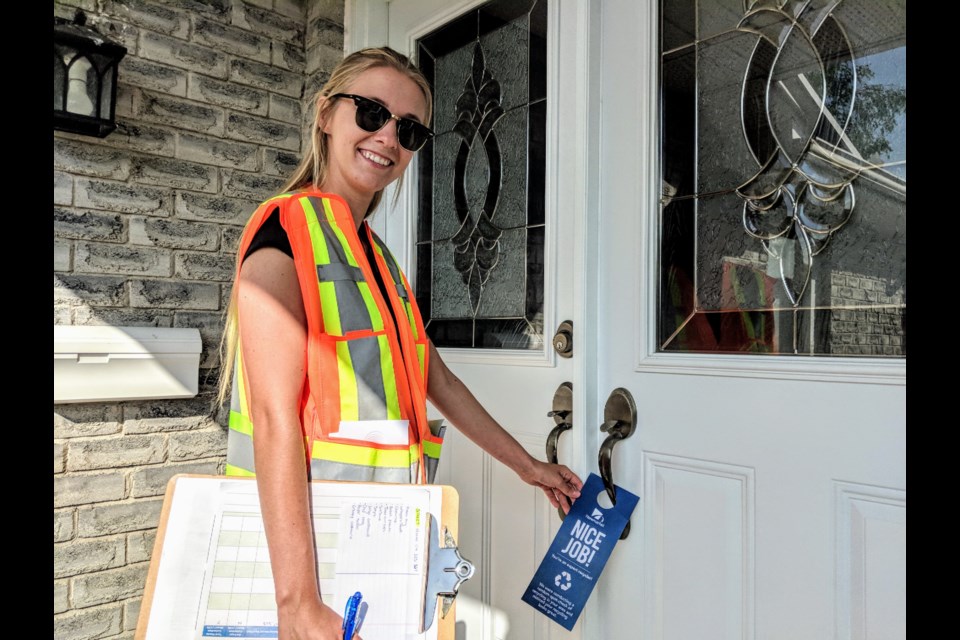A majority of Newmarket residents are doing it, but are they doing it well?
If random, visual spot-checks on Exeter Court during this week’s recycling day are any indication, residents could well use a gentle reminder about what gets tossed in the blue bin.
NewmarketToday tagged along with the Town of Newmarket’s public works director Chris Kalimootoo, waste program administrator Amanda Romano, and summer student Olivia Dymek, as the second week of a campaign unfolded that aims to reduce blue bin contamination, increase recycling, and provide an educational boost along the way.
“We’ve been doing very well with regard to our recycling and separation, but it’s started to plateau,” Kalimootoo said as the team approached the first house to peek inside the blue bin placed at the curb. “It depends on the amount of contamination in the box, the region can sort some of it at the processing plant but if there’s too much contamination, it goes into the landfill.”
The first observation on the small cul-de-sac just off Main Street North, near Newmarket’s downtown, is that nearly all of the homes had placed recyclables at the curb.
The town’s diversion rate has been hovering in the high 60 per cent range for the past few years, and it wants to do better. York Region, as a whole, boasts a diversion rate of 94 per cent.
“I haven’t heard, in my career, anybody say that they want to recycle less, nobody says that,” Kalimootoo said. “Everybody wants to do what’s best for the environment and recycle, and do their green bin as best they can. It’s just that the information needs to get out there with promotion and education and that’s why we’re doing this, to enhance that.”
Dymek, who is working at the town this summer and has an interest in waste management, points out that one home’s blue bin is near perfect in that all plastic, paper, aluminum cans, cardboard, and glass items in it are recyclable — with the exception of a straw that’s been left behind in a plastic, soft drink cup.
“Not everyone is perfect with their recycling, but we’ll let this person know they did a nice job and write a reminder on the back that straws should be placed in the garbage as they’re not recyclable,” Dymek said, as she hung a small paper door hanger at the residence with the words, “Nice Job! You’re an expert recycler! We were conducting a random spot check of recycling in your area and noticed your recycling looks great”.
As the spot checks continued, the vast majority of the 14 homes received a recycling reminder door hanger for various Blue Box no-nos, including paper coffee cups, along with the lids, cardboard that wasn’t flattened and bundled, large pieces of styrofoam packaging, soft plastics, and glass jars with the lid on.
“Coffee cups are not recyclable here and end up in the garbage because they have a wax and plastic coating that can’t be separated,” Dymek said.
Romano added that soft plastics such as bags, plastic overwrap, and lunch baggies are often mistakenly put in the recycling bin.
“That all goes to landfill,” she said.
Contamination of recyclable streams at York Region’s material recovery facility occurs when such things as crushed up plastic water bottles and flattened aluminum cans are placed in the Blue Box. The equipment at the processing plant reads them as paper and it can contaminate that stream.
Plastic bags and wrap, meanwhile, can potentially cause a fire if it gets caught up in the equipment.
Food waste left behind on glass jars and recyclable plastics can also cause contamination and send all your good recycling to landfill, instead of being processed and sold for reuse in the manufacturing of new products.
Just this week, Environment, Conservation and Parks Minister Jeff Yurek said in a statement that the Ontario government’s goal is to make producers 100 per cent responsible for managing the plastic and other packaging they produce.
The Town of Newmarket and the Regional Municipality of York contributed to the recent consultation on Blue Box recycling that resulted in a report on the subject.
Kalimootoo said that he believes producers should be entirely responsible for what they produce through its lifecycle.
“They are the ones that create these things so they should be responsible for it, 100 per cent, absolutely,” he said. “The municipality would still do the garbage, yard waste and green bin for source-separated organics but, hopefully, there would be some savings with respect to the blue bin.”
As it stands now for the Blue Box Program, producers pick up the tab for a little less than half the cost, and the town has to negotiate that each year with industry representatives.
For more information on what can and cannot go in your Blue Box, visit here and download the free Recycling Coach app from the Apple store or on Google Play.

